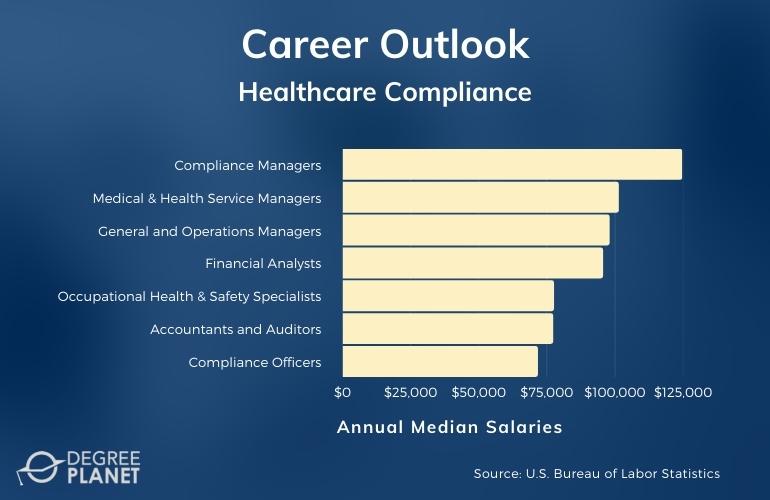If you are interested in ensuring high quality treatment for patients in healthcare institutions, then you might consider earning a healthcare compliance degree.

A bachelor’s degree in healthcare compliance and regulations can help your resume stand out when working toward opportunities in the field. Some graduates pursue roles as compliance analysts, internal auditors, health care affairs specialists, and more.
Editorial Listing ShortCode:
Healthcare compliance professionals have the important responsibility of making sure their organizations are adhering to necessary rules and regulations. By doing so, healthcare institutions, like hospitals and doctor’s offices, can care for their patients safely.
Online Healthcare Compliance Degrees

In many healthcare institutions, medical practitioners spend most of their time helping patients, and they need professionals dedicated to ensuring their practices comply with rules and regulations. This is where healthcare compliance professionals come in.
Healthcare compliance professionals specialize in knowing the laws and standards that apply to different organizations so that they can develop effective processes ensuring compliance. They may also possess skills in training, management, and analysis.
Editorial Listing ShortCode:
An online bachelor degree program in healthcare compliance could be a beneficial option if you are looking for flexibility in your schedule or are unable to attend classes in person.
By pursuing an online bachelor’s in healthcare compliance, you may learn about the following:
- Auditing and risk assessment
- Training and monitoring staff
- Developing effective processes
- Making ethical decisions
- Adhering to laws and regulations
- Root-cause analysis
After completing their bachelors, some graduates choose to pursue a masters in healthcare compliance. Others immediately seek opportunities in the healthcare field, in institutions like hospitals, medical centers, and private practices.
Healthcare compliance professionals may work in other sectors as well, like manufacturing and construction. Since there are a variety of organizations that must adhere to health compliance regulations, there is a need for these roles across a wide range of industries.
Graduates tend to pursue careers as compliance officers, healthcare affairs specialists, and medical and health service managers. They may also choose to pursue opportunities as internal auditors, privacy analysts, and risk managers.
Healthcare Compliance Careers & Salaries

A degree in health care compliance and regulations may help prepare you for careers in hospitals, doctor’s offices, outpatient care centers, and other areas of the healthcare field.
Many of these roles, like health information technologists and medical registrars, may consist of working regular business hours in an office setting, although some may require night or weekend shifts. It’s common in some of these jobs to spend a lot of time on the computer.
According to the Bureau of Labor Statistics, here are some career paths related to healthcare compliance.
| Careers | Annual Median Salaries |
| Compliance Managers (Included in Managers, All Other) | $124,650 |
| Medical and Health Service Managers | $101,340 |
| General and Operations Managers | $97,970 |
| Financial Analysts | $95,570 |
| Occupational Health and Safety Specialists | $77,560 |
| Accountants and Auditors | $77,250 |
| Compliance Officers | $71,650 |
| Health Information Technologists and Medical Registrars | $55,560 |
| Occupational Health and Safety Technicians | $51,120 |
| Bookkeeping, Accounting, and Auditing Clerks — Healthcare and Social Assistance | $41,100 |
A healthcare compliance and regulations degree can be applied to a variety of roles in the healthcare field. The jobs you may qualify for depends on your education, experience, skills, and other factors.
Healthcare occupations are expected to grow by 13% over the next ten years, according to the Bureau of Labor Statistics. Some of the careers under this umbrella are projected to experience faster than average job growth.
Editorial Listing ShortCode:
For instance, the demand for medical and health service managers is predicted to grow by 28%, and employment for health information technologists and medical registrars is expected to grow by 17%.
Healthcare Compliance Bachelor’s Curriculum & Courses

The curriculum for healthcare compliance programs may vary, but schools generally cover principles in compliance, ethics, management, and operations, among others.
Here are a few courses you may take as a student working toward a healthcare compliance bachelor’s degree:
- Compliance and the Health Care Industry: This course covers the fundamentals of health care compliance and looks at regulations on the federal and state levels.
- Monitoring and Auditing for Health Care Compliance: You’ll learn systems for monitoring and auditing health care processes to ensure they adhere to a variety of regulations.
- Corrective and Preventive Action Plans: This class focuses on how to address compliance issues as well as how to identify problems and prevent them from happening in the first place.
- Managing Across Boundaries: You’ll examine a variety of entities, including governments and nonprofits, and how they work with each other on different levels.
- Ethical and Legal Considerations of Healthcare: This course looks at how ethical and legal factors can affect healthcare policies.
- Healthcare Finance: You’ll learn about accounting and financial management as they are used in the healthcare field.
- Regulatory Essentials of Compliance Program Design: This course explores regulations in the healthcare industry, such as patient rights and protected health information.
- Healthcare Marketing: You’ll learn how to create and implement marketing strategies for healthcare institutions.
- Healthcare Reimbursement: This class covers a variety of factors that influence the business of healthcare practices, such as supply and demand theory and budgeting.
- Building Leadership Skills: You’ll learn a variety of leadership ideologies and how to develop your own leadership skills.
In addition to the knowledge you can gain in these courses, many healthcare compliance programs aim to teach useful skills like critical thinking and ethical decision-making.
Admissions Requirements

Although the admissions requirements for healthcare compliance bachelors degrees may vary, a few common ones are listed below:
- High school diploma. Some schools may require a minimum GPA.
- SAT or ACT scores. Not all schools require standardized test scores, so it’s helpful to check with your prospective school.
- Coursework. Some schools may want to see completion of specific coursework, such as lab sciences or math.
In addition to these materials, you may also be asked to provide a high school transcript and pay a fee to submit your application.
Accreditation

A regionally accredited school means that the school has met a set of academic and quality standards. Attending a regionally accredited institution can help you stand out when looking for jobs, as employers may look for this qualification. It can also be an eligibility factor for receiving financial aid or for pursuing graduate programs down the road.
Editorial Listing ShortCode:
To find out if the school you’re interested in is regionally accredited, you can visit the US Department of Education’s website.
CCB Accreditation
The Compliance Certification Board (CCB) recognizes individuals who have met compliance and ethics standards through their compliance certification programs. The CCB is also the preferred accreditation organization for healthcare compliance.
Colleges and universities can seek to have their compliance and ethics programs accredited by the CCB to demonstrate that their programs meet industry standards and quality. Completing a CCB accredited program can also be a step toward becoming CCB certified as a healthcare compliance professional.
Healthcare Compliance Licensure and Certifications

There are a variety of professional certifications you may want to work toward as part of your healthcare compliance career.
The Compliance Certification Board (CCB) and the American Health Information Management Association (AHIMA) recognize individuals with the following certifications, among others:
- Certified in Healthcare Compliance
- Certified in Healthcare Privacy Compliance
- Certified in Healthcare Research Compliance
- Certified in Healthcare Privacy and Security
- Certified Documentation Improvement Practitioner
Industry certifications may help you to demonstrate your proficiency and skill sets to potential employers. They may also be useful in enhancing your credibility in your current profession.
Financial Aid and Scholarships

There are a variety of financial aid opportunities that may be available to students who qualify. For starters, it’s necessary to attend an accredited school in order to be a candidate for federal financial aid.
Undergraduate students may be contenders for direct subsidized or unsubsidized loans. Direct subsidized loans can be granted to some students who demonstrate financial need, and the US Department of Education generally pays for the interest on these loans.
You can also explore scholarship opportunities offered by your school of interest or by outside organizations. To look into your options, you can visit the Federal Student Aid website.
What Is Healthcare Compliance?

Healthcare compliance is the process of ensuring that organizations follow federal, state, and other legislative rules and regulations. By adhering to compliance practices, healthcare institutions can prevent fraud, abuse, and waste.
Healthcare compliance laws, such as HIPAA and HITECH, were created to ensure patients receive high-quality treatment. Organizations like the Department of Health and Human Services also help oversee compliance in healthcare organizations.
Many institutions create compliance plans, which include policies and procedures they need to follow to adhere to regulations. Healthcare compliance officers are usually involved in creating, training, and enforcing these plans for their organization.
Is Healthcare Compliance a Good Career?

Yes, healthcare compliance is a good career for many professionals. Healthcare compliance professionals may pursue rewarding career opportunities that help keep healthcare institutions safe and effective. Many roles in this field involve a mix of operations, leadership, legal, and project management responsibilities.
Depending on their education, experience, and other factors, healthcare compliance professionals may qualify for a range of opportunities. Some work as compliance officers, accountants, medical records specialists, occupational health and safety specialists, and more.
Editorial Listing ShortCode:
According to the Bureau of Labor Statistics, healthcare occupations, including several roles associated with healthcare compliance, are expected to experience faster than average job growth over the next ten years.
What Can You Do with a Healthcare Compliance Degree?

A healthcare compliance degree may help you qualify for a range of job opportunities in the healthcare field. Graduates tend to pursue careers in hospitals, medical centers, and private practices, though this degree can be applied to a variety of industries and institutions.
According to the Bureau of Labor Statistics, medical and health services managers are among the higher-paying careers associated with healthcare compliance. Some professionals with this degree work as auditors, compliance officers, or health information technologists, while others continue their educations in an on-campus or an online MBA in Healthcare Administration program, for example.
What Does a Healthcare Compliance Officer Do?

A healthcare compliance officer ensures that their organization is adhering to a variety of federal, state, and other types of rules and regulations. These laws aim to create environments where people are safe and treated well.
There are a variety of ways in which a healthcare compliance officer can do this, including creating compliance plans, implementing policies and procedures, and training employees. They may also conduct internal audits, address and correct issues, and create compliance committees.
Healthcare compliance officers are generally very knowledgeable about the regulations that apply to their organization so that they can effectively communicate and enforce them.
How Long Does It Take to Get a Healthcare Compliance Degree Online?

The timeframe for obtaining an online healthcare compliance degree varies depending on the program you choose to attend and your enrollment status.
Your schedule, obligations, and career trajectory may be factors to consider when choosing the program length that’s right for you. It generally takes 4 years to complete a bachelor’s degree if you attend classes full-time and if your program follows a traditional 16 week semester.
Some online programs enable you to finish sooner, allowing you to attend classes year-round and offering class terms that are 6 to 8 weeks long.
Is a Healthcare Compliance Degree Worth It?

Yes, a healthcare compliance degree is worth it for many students. According to the Bureau of Labor Statistics, healthcare occupations will likely experience 13% job growth over the next ten years, with medical and health service managers predicted to experience 28% job growth.
Editorial Listing ShortCode:
Although graduates commonly pursue jobs in the healthcare industry, healthcare compliance professionals are needed in a variety of sectors, such as construction, manufacturing, and government. Overall, compliance officers are expected to see 4% growth over the next ten years, which is as fast as average (Bureau of Labor Statistics). Holding a bachelors degree can also help advance your professional qualifications for your chosen career.
Universities Offering Online Bachelors in Compliance Degree Programs
Methodology: The following school list is in alphabetical order. To be included, a college or university must be regionally accredited and offer degree programs online or in a hybrid format.

Arizona State University offers a Bachelor of Science in Health Care Compliance and Regulations. This interdisciplinary program combines key concepts from health sciences, business administration, engineering, and law. This degree can be completed entirely online. It requires the completion of 120 credit hours, which can typically be done in 4 years of full-time study.
Arizona State University is accredited by the Higher Learning Commission.

Maryville University offers a 100% online program for a Bachelor of Science in Healthcare Management Curriculum.
This program is designed to help students develop the skills needed to serve as successful leaders in the field of healthcare. The curriculum covers topics like business operations, public health, risk management, healthcare technology, and financial management. Incoming students can choose one of three start dates.
Maryville University is accredited by the Higher Learning Commission.

Rutgers University offers a Bachelor of Science in Health Information Management. Upon graduating, many students pursue administrative and leadership positions in settings like hospitals, rehab centers, insurance companies, and clinics. After completing general baccalaureate education requirements, students only need to complete 61 major-specific credits to obtain this degree. All classes are held online.
Rutgers is accredited by the Middle States Commission on Higher Education.

Southern New Hampshire University offers a Bachelor of Science in Healthcare Administration. Students can select a concentration in either Health Information Management or Patient Safety and Quality. The convenient online format gives students around the clock access to learning materials so they can learn on their own schedules. The program requires the completion of 120 credit hours.
Southern New Hampshire University is accredited by the New England Commission of Higher Education.

The University of Arizona offers a fully online program for a Bachelor of Science in Care, Health, and Society. This program may be an ideal fit for students interested in pursuing positions in social services, community outreach, healthcare support, or administration. To graduate, students must complete a minimum of 120 credit hours. On average, the program can be completed in 4 years.
The University of Arizona is accredited by the Higher Learning Commission.
Getting Your Healthcare Compliance Degree Online

A healthcare compliance career can be rewarding for many, as it involves ensuring that organizations are safe and ethical. According to the Bureau of Labor Statistics, there are roles associated with healthcare compliance that offer above average pay, many with positive job outlooks as well.
By pursuing a healthcare administration degree online with a specialization in compliance, you may learn about regulations, process development, management, and more. This type of program can also help you improve your problem-solving and decision-making skills. Healthcare compliance is an essential field for patient safety and well-being in many institutions.
If you’re not sure where to start, you can begin by exploring accredited colleges and universities. You may find an online healthcare compliance program that aligns with your needs and piques your interest!

